DEPARTMENT
NEWS
2023
Congratulations to Mandana Limbert
who was elected a member of the Austrian Academy of Sciences
this year for her research in Southern Arabia. Nominated by the
Institute for Social Anthropology, she is the first socio-cultural
anthropologist to be elected as a corresponding international member
(the highest recognition for international scholars) of the Austrian
Academy of Sciences since 1945. The Austrian Academy of Sciences is a
non-university scholarly institution boasting numerous Nobel Prize
winners (in physics) among its members. For more information about this
presitigious accomplishment, click here: https://www.oeaw.ac.at/en/oeaw-home/austrian-academy-of-sciences
2021
We are thrilled to announce that Professor Juan Luis Rodriguez Aponte's new book, Language and Revolutionary Magic in the Orinoco Delta, has won the 2021 New Voices Book Prize from the Society for Linguistic Anthropology.
In this book, which focuses on the relationship between language and
politics in Venezuela, Professor Rodriguez uses ethnographic research
to explore the linguistic and semiotic strategies used by the
revolutionary government of Hugo Chávez to produce forms of political
participation and how the state is sustained by processes of
translation between languages (Warao and Spanish) and the
transformation of natural resources into political influence.
Congratulations, Professor Rodriguez!
Congratulations to Professor Karen Strassler,
who received a research grant from the Wenner-Gren Foundation for her
project entitled “Image-Work and the Visual Politics of Breast
Cancer”. Dr. Strassler’s project focuses on the ways people with
breast cancer make and circulate images as part of the process of
adapting to their changing bodies. Image-making practices have
become integral to the ways people confront their experiences of breast
cancer, including “cancer journey” chronicles shared with family and
friends, images posted to social media groups for cancer survivors,
private documentation of treatment, posing for professional pre- and
post-mastectomy photo shoots, as well as art and explicitly activist
images. In this project Dr. Strassler asks how, in making and
circulating these images, people may also challenge the ways we as a
society look at both women’s bodies and cancer. She is
particularly interested in how issues of environmental toxicity and
racial disparities in medical care, which are routinely screened out of
public imagery and discourse about breast cancer, might be addressed in
some of these images.
We
were saddened to learn that Professor Emeritus Ed Hansen died of lung
cancer on August 14 at his home in Amherst, MA. Professor Hansen joined
the Department of Anthropology at Queens College in 1968 and retired in
2000. Click here
to download a tribute to Professor Hansen written by another member of
our department who retired that same year, Professor Ronald Waterbury.
Professor Hansen's obituary in the Ames Tribune can be found here.
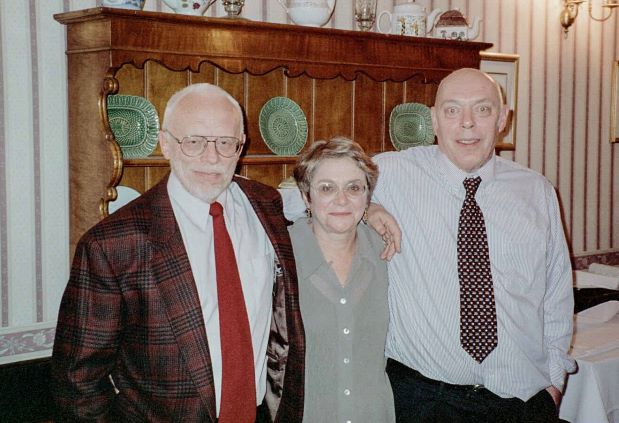 Professor Ed Hansen (right) with wife, Geraldine (middle), and Professor Ron Waterbury (left)
Professor Ed Hansen (right) with wife, Geraldine (middle), and Professor Ron Waterbury (left)
Congratulations
to our most recent crop of outstanding anthropology majors earning
Honors and High Honors and department awards! Our junior awards now
consist of three named awards: the Frank Spencer Memorial Award,
given to the most promising junior concentrating in biological
anthropology, and two new awards in honor of the former colleagues we
lost in 2020, the Warren DeBoer Memorial Award for the most promising junior concentrating in archaeology and the Edgar Gregersen Memorial Award for the most promising junior concentrating in linguistic or cultural anthropology. Our senior awards continue to include the Lynn Ceci Memorial Award for an outstanding graduating senior concentrating in archaeology, the Paul Mahler Memorial Award for an outstanding graduating senior concentrating in biological anthropology, and the Hortense Powdermaker Award for an outstanding graduating senior concentrating in cultural or linguistic anthropology.
Frank Spencer Memorial Award: Zacharia Farrell
Warren DeBoer Memorial Award: Rachel Tauber
Edgar Gregersen Memorial Award: Sajah Archer
Lynn Ceci Memorial Award: Anna Lelonek & Carolyn Mikowski
Paul Mahler Memorial Award: Daniel Yakubov
Hortense Powdermaker Award: Bridget McCann
For the
complete list of 2021 awardees, including senior and junior honors, click here. Congratulations to all!
Zacharia Farrell receives the Frank Spencer Memorial Award. Rachel Tauber receives the Warren DeBoer Memorial Award. Bridget McCann receives the Powdermaker Award.
Sajah
Archer
receives the Edgar Gregersen Memorial
Award.
Anna Lelonek (left) & Carolyn Mikowski (right) receive the Lynn
Ceci Memorial Award.


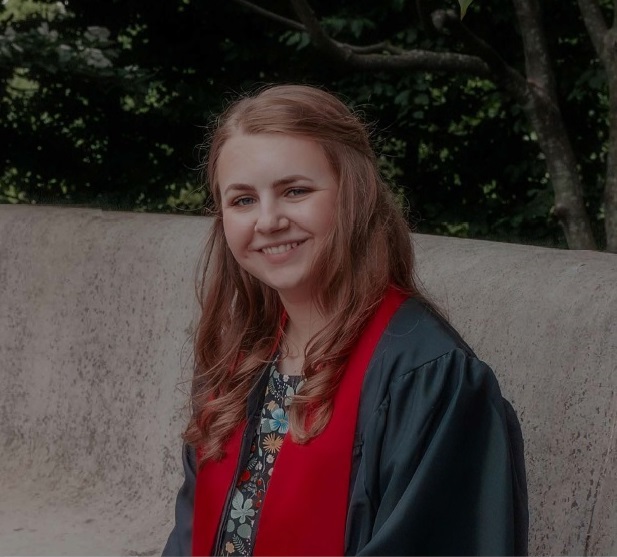 Daniel Yakubov receives the Paul Mahler Award.
Daniel Yakubov receives the Paul Mahler Award.
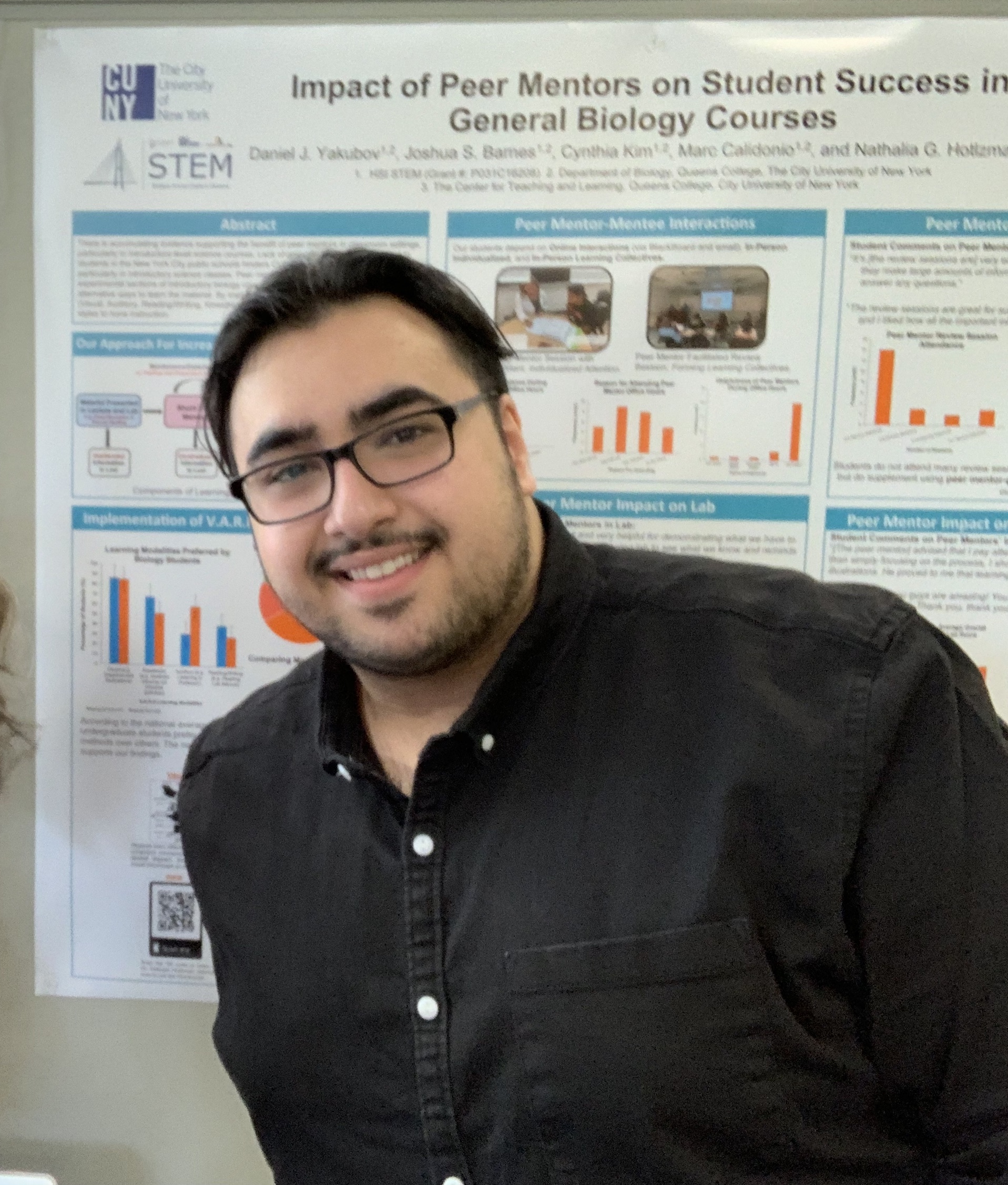
Professor
Murphy Halliburton
recently wrote an editorial piece on COVID vaccine patents and the
Indian pharmaceutical industry, published in The Hindu, one of the
largest newspapers in India. Read the article here:
"The AIDS fight offers a COVID vaccine patent pathway".
Miriam Fried, Class of 2020, was awarded the
Joan Thornton McManus Memorial Prize for Academic Excellence, an award given annually to the Queens College graduate with the highest grade-point average. Miriam received the
Lynn Ceci Award from the Department of Anthropology
last year and is currently a first year PhD student in cultural
anthropology at the CUNY Graduate Center. Congratulations Miriam!
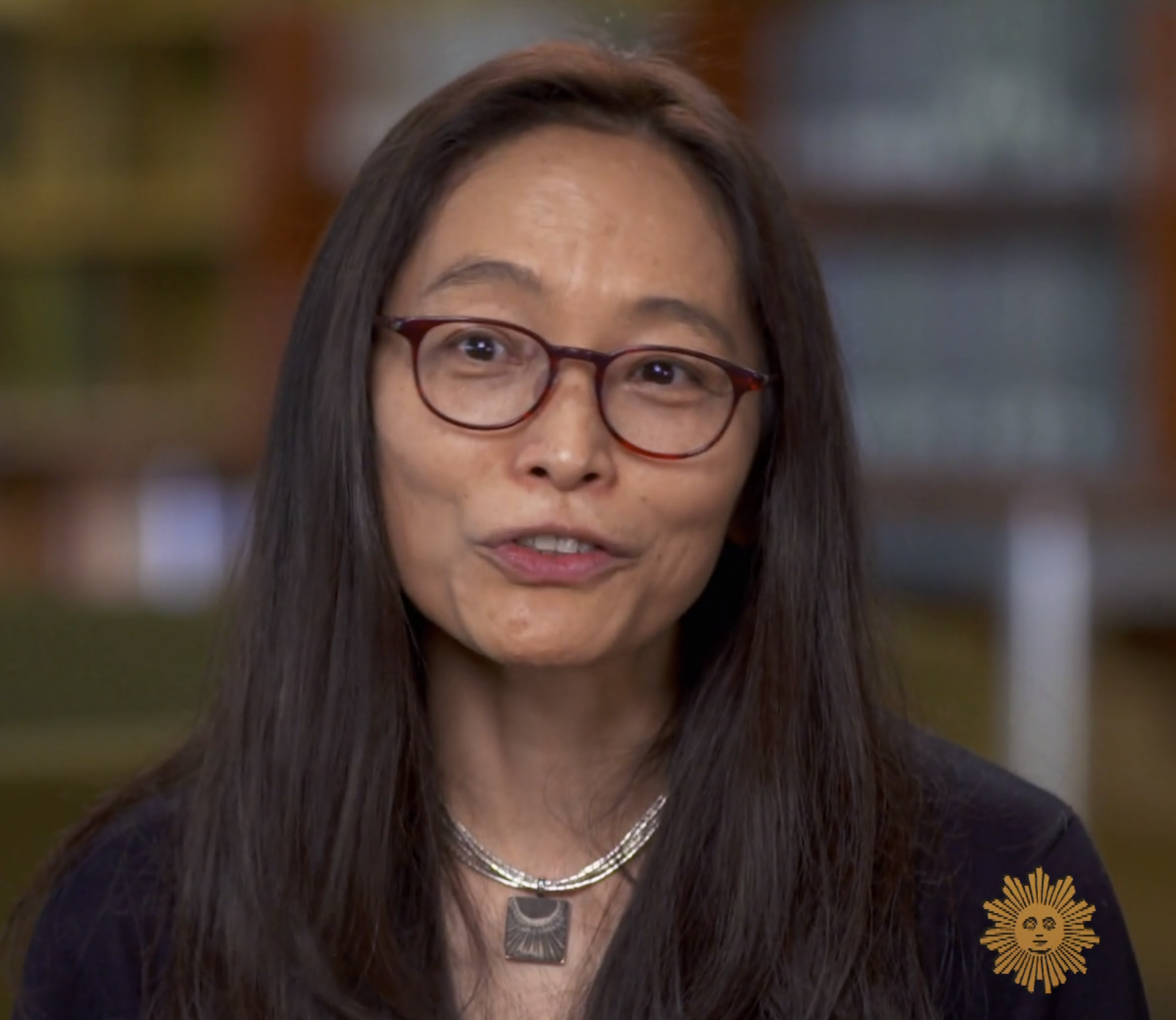
Professor
Miki Makihara
was tapped by CBS Sunday Morning for her expertise on Rapa Nui, also
known as Easter Island, in a piece about the first music school on the
island:
https://www.cbsnews.com/news/rapa-nui-first-music-school-on-easter-island/
Excerpt from the interview:
In
the late 19th century, slave raiders from Peru abducted about half the
island's population, and left behind smallpox, which killed many of the
remaining islanders. Only 111 Rapa Nui survived.
"We're talking about a place that's only been inhabited by humans for maybe 1,000 years?" Sanneh (interviewer) said.
"That is true, right, but a lot has
happened," said Miki Makihara, a linguistic anthropologist at Queens
College in New York, who has been studying Rapa Nui culture for 30
years. "It's a remarkable history of survival and reconstruction."
Sanneh said, "Those 111 people kept the language alive, and transmitted it to the next generation - it's a comeback story."
"Yes!" Makihara laughed.
The Department is pleased to announce
Anthropology Peer Tutoring sponsored by the
Anthro Society. For more details, see
attached pdf.
Jemima Georges,
Anthropology Adjunct Instructor, received a Doctoral Dissertation
Research Improvement Grant from the National Science Foundation to
support her PhD research in collaboration with Professor
Tim Pugh.
Her project “Food and Social Complexity” will investigate the social
inequality of subsistence during early urbanization in the Maya world.
For more details see:
www.nsf.gov/awardsearch/showAward?AWD_ID=2112519&HistoricalAwards=false
Katarina Evans,
Anthropology Adjunct Instructor, received a research grant from the
L.S.B. Leakey Foundation for her PhD research on “Evolution of the
Coercive Pair Bond in Hamadryas Baboons” in collaboration with
Professor Larissa Swedell.
Professor
Jim Moore
retired at the end of January 2021, after over 40 years of research,
teaching, and service to the Queens College community. A
historical archaeologist who worked in Sweden, Ireland, and the borough
of Queens, Professor Moore’s work on the
historic Bowne House in Flushing,
much of it in collaboration with Queens College undergraduates,
substantially revised the history of the initial settlement of Queens
and New York and continues to enrich our understanding of the history
of the African population in the borough. Professor Moore served
as Department Chair for many years, and also chaired the Human Subjects
Internal Review Board, laying the foundation for our current robust
process of review. He also served for five years as archaeology
subfield coordinator for the Anthropology doctoral program at the
Graduate Center and
in various other service roles for the discipline of archaeological
anthropology. Among Prof. Moore’s most important service work was
at a community level, as a founder of the
Queens College School for Math, Science, and Technology (PS 499) and the
Queens School of Inquiry (Q252). We are sorry to see Professor Moore leave us and we wish him all the best in his retirement!
2020
Professor
Tim Pugh received a grant from the National Science
Foundation for his project entitled "State Emergence and Hyperprimacy
at Nixtun-Ch'ich', Petén, Guatemala." For this project, Dr. Pugh and a
team of scholars will investigate dynamics in the development of cities
and states in the polity surrounding Nixtun-Ch’ich’ in Petén,
Guatemala. Understanding the rise of states requires that we
characterize their variations, not just study those that fit rigid
stereotypes. This work will specifically address a possible case of
hyperprimacy in the Middle Preclassic period (800-300 B.C.) Maya polity
of Nixtun-Ch’ich’. Hyperprimacy occurs when the capital is massively
larger than secondary and tertiary central settlements. Such capitals
generally overdominate social, religious, and economic relationships
within the polity. This research will involve a LiDAR survey and
intensive excavations.
Professor
Omri Elisha received a grant from the Wenner-Gren
Foundation for his project entitled "Enchanting Expertise: Knowledge,
New Media, and Professionalism in Western Astrology." Dr. Elisha’s
project explores how working astrologers in the U.S. incorporate
secular and occult knowledge practices, ethics of professionalism, and
new media strategies in their efforts to promote astrological expertise
as a source of insight and cultural capital. Probing beyond tabloid
horoscopes and Internet memes, this ethnographic project asks: How do
modern astrologers project authority and cultivate public trust? What
are the procedures for authenticating expertise when it comes to
astrological skills, and how are they differentiated from cultural
domains such as science, cosmology, psychology, and religion? What
forms of ethical and historical consciousness are made possible, or
impeded, by the metaphysical principles that underlie horoscopic
forecasts?
We are proud to welcome
Dr. Megan Rhodes
Victor to the QC Anthropology Department! Dr. Victor received her
Ph.D. from the
College of William & Mary and most recently was a post-doctoral
scholar at Stanford University. Dr. Victor is a historical
archaeologist and her research focuses on colonialism, immigration,
commensal politics, and gendered practices among historically
marginalized groups. Most recently, she has been studying the
archaeology of taverns, saloons, and social negotiation in 18th and
19th century colonial North America, including a project on "Molly
Houses." Molly houses operated in secrecy in back rooms or upper floors
of taverns and provided an opportunity for gay, transgender, and
cross-dressing individuals in 18th-century England and the English
Colonial World to meet with one another in a world where such actions
were capital offenses. This project is the first to archaeologically
examine these spaces of the LGBTQ+ community. In addition to her
research and curricular contributions, Dr. Victor brings with her an
extensive archaeological collection for student projects and an
expertise in the intersection of archaeology and video games, including
virtual reality of archaeological fieldwork and 3D scanning, referred
to as "archaeogaming”!
Congratulations
to all our
QC Anthropology students who have
recently
received awards honoring their
stellar achievements in our department! On May 26th, 2020, we held a
virtual award ceremony (
link to
ceremony here)
recognizing our wonderful students who have excelled in their academic
progress, even in spite of the challenges that 2020 has presented. This
year, we introduced two new awards in honor of
former faculty members,
Edgar Gregersen (1937-2020) and Warren DeBoer (1945-2020). The Edgar
Gregersen Memorial Award is given to the most promising student
specializing in anthropological linguistics or cultural anthropology.
The Warren DeBoer Memorial Award is
given to the most promising junior student concentrating in
archaeology. For
the complete list of students who earned Anthropology Honors and Awards
this year, click
here. (a few screenshots of awardees
provided below):
Daniel Muras receives Powdermaker Award
Wade Li receives Paul Mahler Award
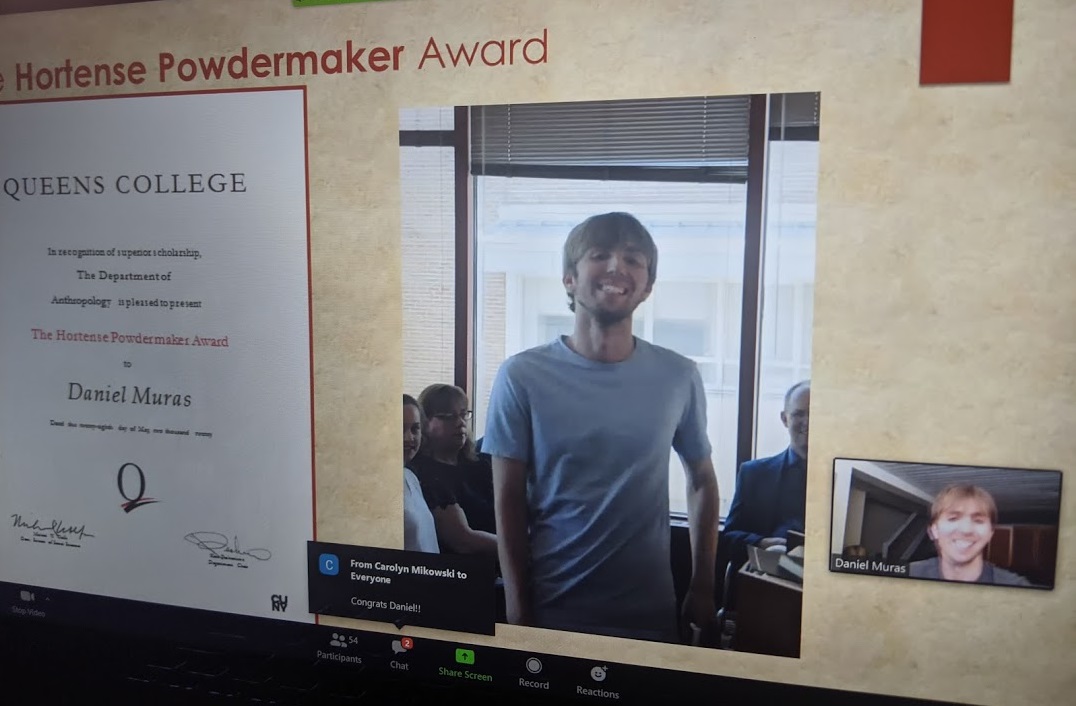
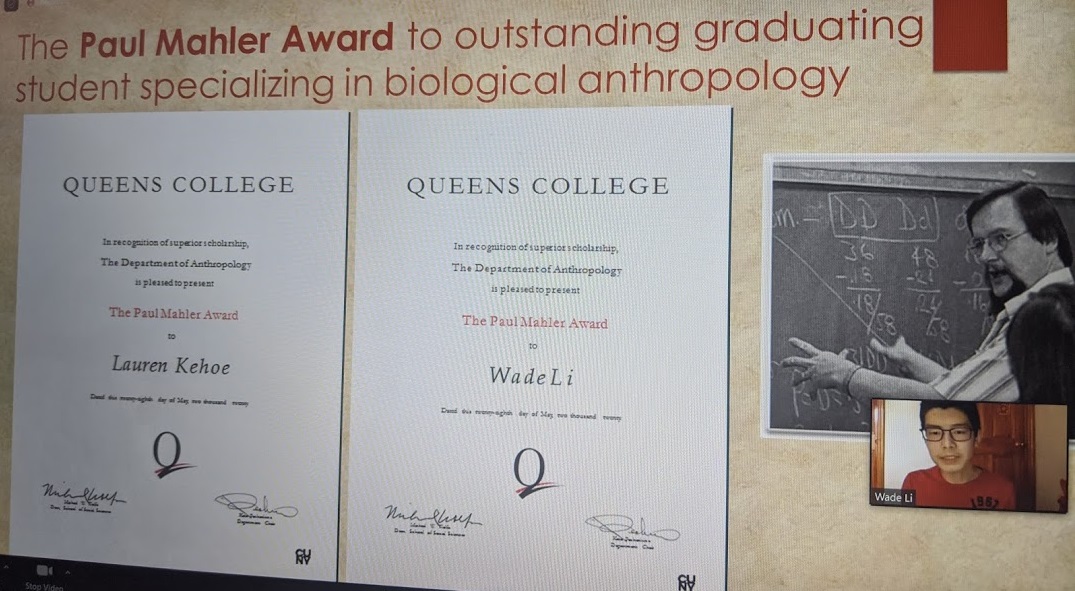
Brittany Collins receives High Honors
Lauren Kehoe receives Paul Mahler Award
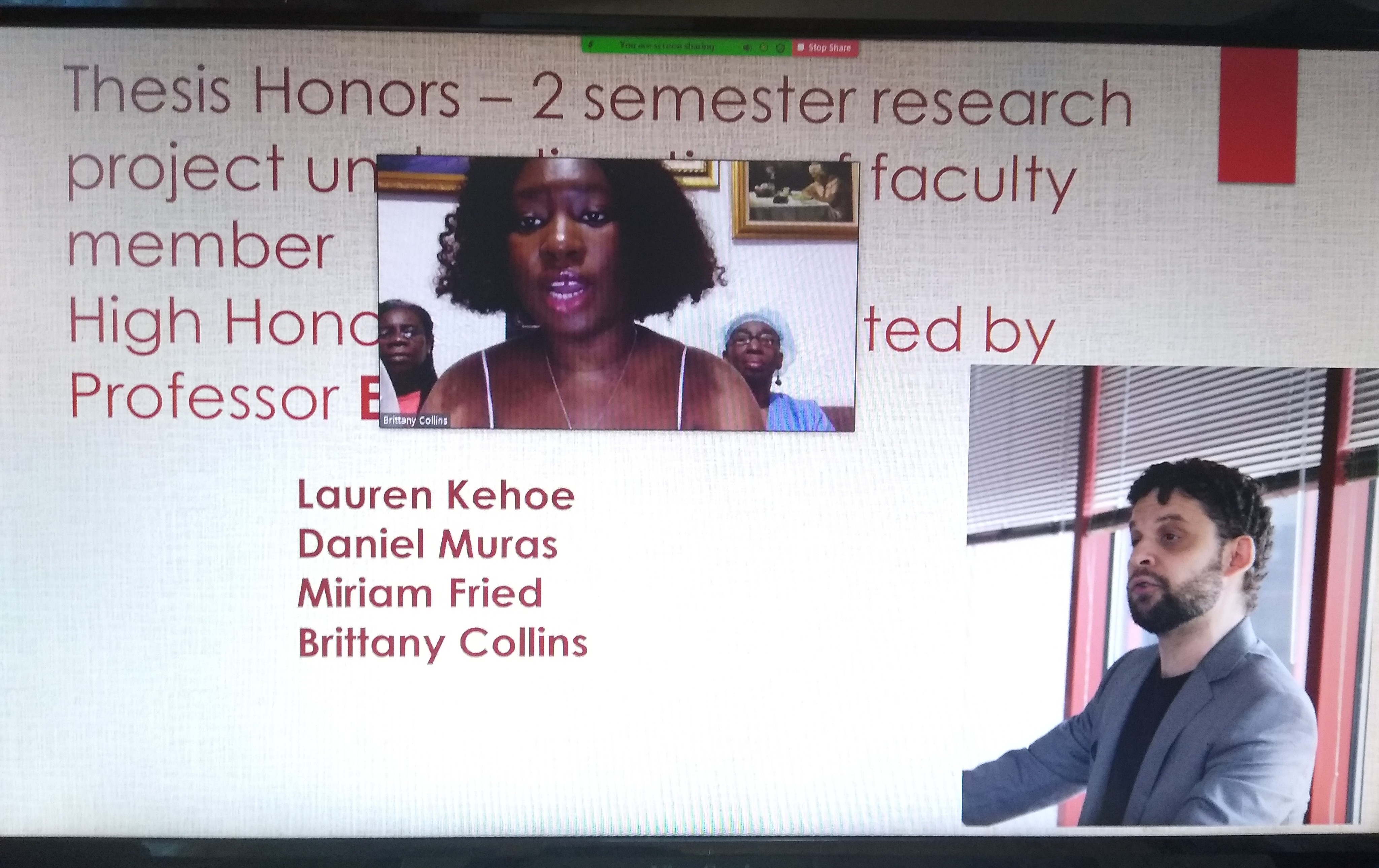
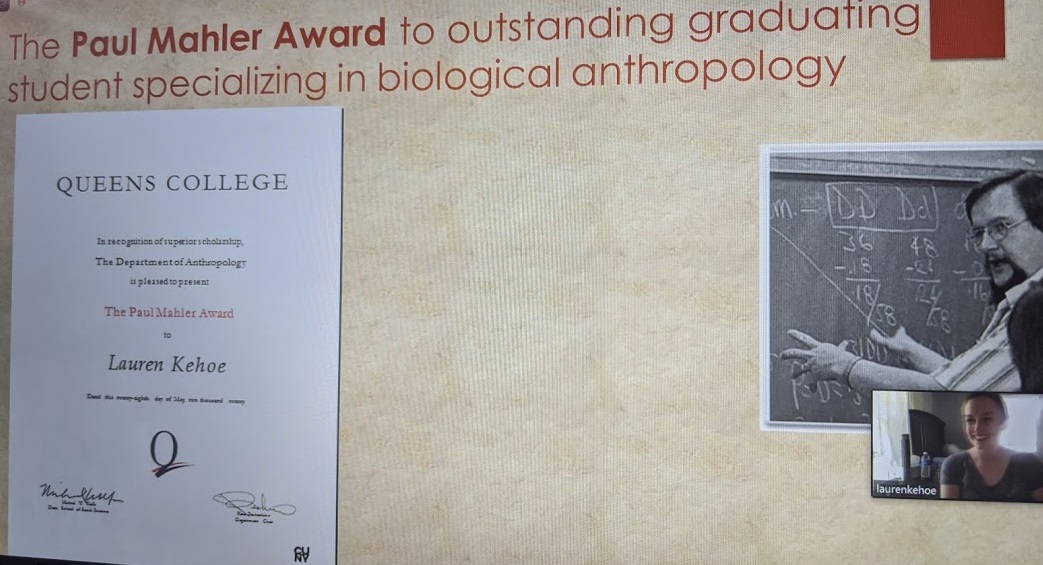 Miriam Fried receives Lynn Ceci Award
Kelly McLafferty receives Lynn Ceci Award
Miriam Fried receives Lynn Ceci Award
Kelly McLafferty receives Lynn Ceci Award
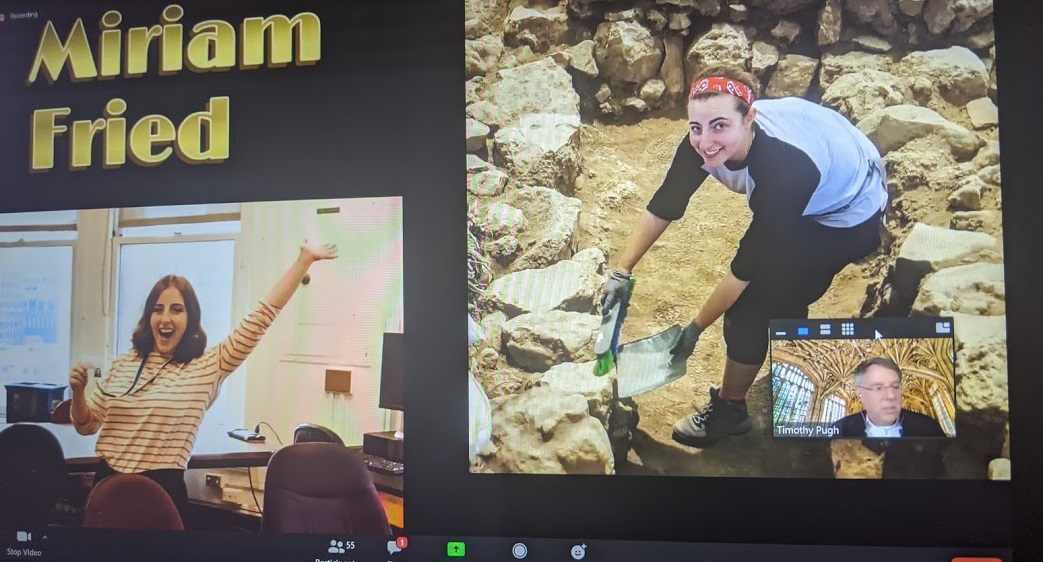
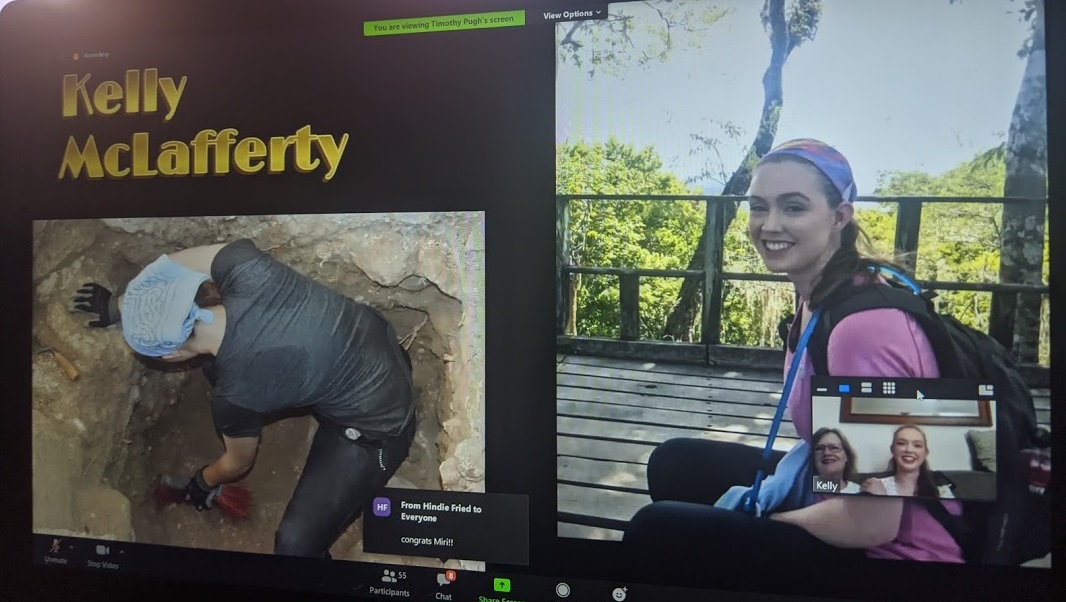
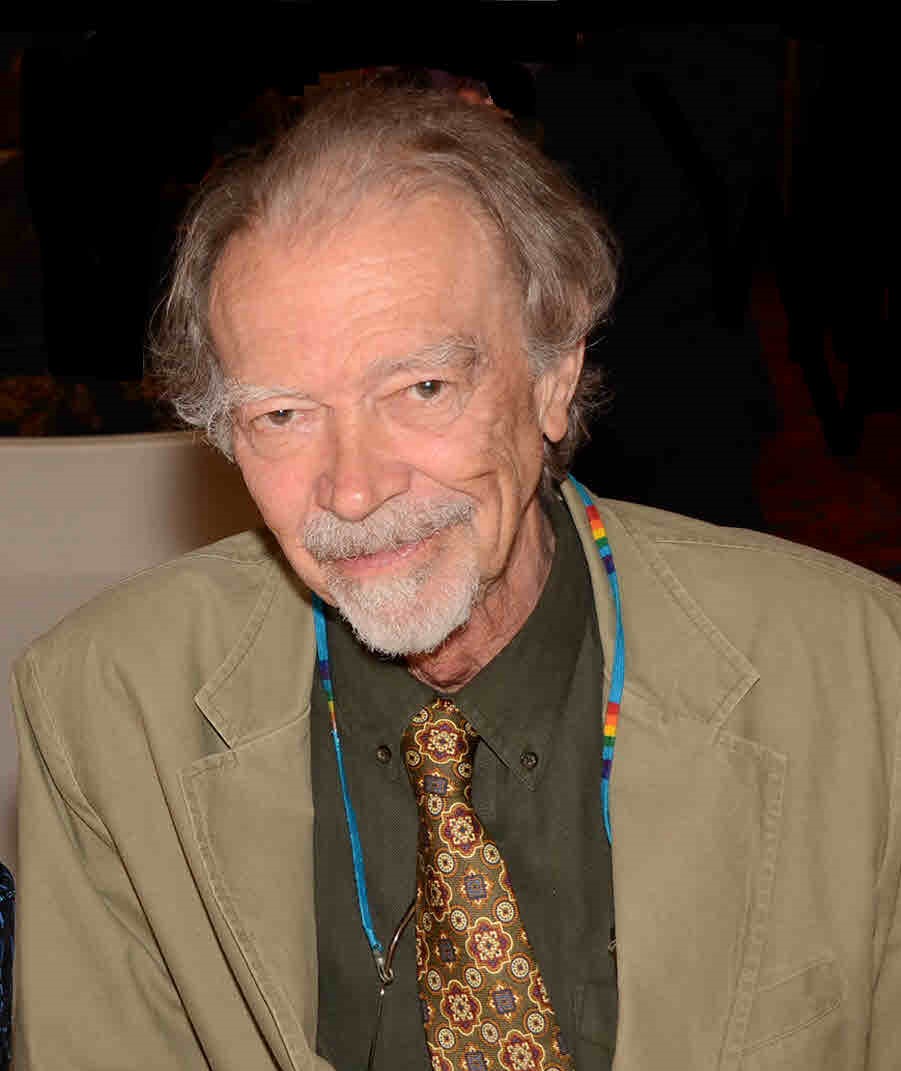
We
are deeply saddened by the
recent loss of one of our professor emeriti,
Warren
DeBoer.
Professor Warren DeBoer joined
the Department of
Anthropology at Queens College in 1972 and retired in
2012. Universally loved by students, Dr. DeBoer taught Introduction to
Archaeology, Peoples of
North America, and Archaeology of North
America, foundational courses for our anthropology majors, for 40
years. With an infectious dry humor, he had
the ability to walk into a
classroom and simply start talking, and his analytical mind seemed to
never stop turning. Dr. DeBoer was a prolific renaissance
archaeologist
whose many accomplishments were not confined to a particular area,
time, or topic. He is best known for his ethnoarchaeological and
ethnohistorical work in South America, where he studied
modern
behaviors of indigenous peoples to help to understand patterns observed
by
archaeologists. This work involved a range of topics such
as
cultural ecology, ceramic decoration and use-life, manioc consumption,
feasting, ceremonial
areas, and raiding. Dr. DeBoer also conducted
archaeological research on ancient populations in North America,
examining topics such as storage pits
and the economic surplus,
exchange networks and sacred journeys, and gambling. As a great writer,
he was able to communicate to a broad range of
scholars and his
research will likely remain important to archaeology and beyond for
generations to come. Many members of the Department of
Anthropology
today still regard Dr. DeBoer as a father figure and we were deeply
saddened by his death from esophageal cancer on May 24, 2020. We
have commemorated his legacy by offering an annual award
to promising
undergraduates at Queens College who may one day follow in his
footsteps:
The
Warren DeBoer Memorial
Award. If you would like to make a donation to this
fund, in honor of Dr. DeBoer,
follow this link.
Juan Luis
Rodriguez's new book
"Language and
Revolutionary Magic in the Orinoco Delta" (Bloomsbury Press)
will be available in
Fall
2020 but is available for pre-order. The book, which examines
linguistic practices and national politics in rural Venezuela, is
described below:
Exploring
the ways in which the development of linguistic practices helped expand
national politics in remote, rural areas of Venezuela, Language
and Revolutionary Magic in the Orinoco Delta situates
language as a mediating force in the creation of the 'magical state'.
Focusing on the Waraos speakers of the Orinoco Delta, this book
explores center–periphery dynamics in Venezuela through an innovative
linguistic anthropological lens.
Using
a semiotic framework informed by concepts of 'transduction' and
'translation', this book combines ethnographic and historical evidence
to analyze the ideological mediation and linguistic practices involved
in managing a multi-ethnic citizenry in Venezuela. Juan Luis Rodriguez
shows how indigenous populations participate in the formation and
contestation of state power through daily practices and the use of
different speech genres, emphasising the performative and semiotic work
required to produce revolutionary subjects.
Establishing
the centrality of language and semiosis in the constitution of
authority and political power, this book moves away from seeing
revolution in solely economic or ideological terms. Through the
collision between Warao and Spanish, it highlights how language
ideologies can exclude or integrate indigenous populations in the
public sphere and how they were transformed by Hugo Chavez'
revolutionary government to promote loyalty to the regime.
Congratulations to Anthropology
major, Miriam Fried, for receiving two prestigious QC awards including
the
Raymond Taylor QC Scholars Endowment and the
Brownstein-McDermott Scholarship in Humanities.
2019
Mandana
Limbert gave this year's Fredrik Barth Memorial Lecture at
the University of Bergen in Norway. Her lecture draws on ethnographic
and archival work in a town in interior Oman and explores how ideas of
and practices shaping categories of political home and identity,
"nation" and "Arabness" have shifted over the course of the 20th
century. More details on her lecture can be found here.
Kevin Birth
was one of the guests on the November 1 edition of NPR's
"The Pulse." In his first segment,
which appears from about the
4:00-minute
mark to the
8:30-minute mark,
he explains the use of master clocks from around the world and how
they’re used to help calculate time. He also explains about how time
zones came to be, how the second came to be defined, and what a
tropical or solar year is, and he talks about the “Frankenstein
monster” of the different cultural backgrounds of elements of time
measurement. He closes out the program too, beginning at about the
43:15 mark. He shares about how, when he lived in Trinidad, years ago,
he stopped looking at his watch—knowing that certain stores would open
as long as customers were there, or that he could catch interviewees
during the day whenever he heard the theme from
The
Young and the Restless;
especially the problem of trying to time cooking (the perceived need
for Minute Rice, for instance); and when his interviewer asks him about
favorite time-related objects, he mentions, among other things,
Japanese Edo clocks and the “pissing baboons” at the Metropolitan
Museum of Art. You can listen to the podcast from this page:
https://www.npr.org/podcasts/381443461/the-pulse
Karen
Strassler's new book,
"Demanding
Images: Democracy, Mediation, and
the Image-Event in Indonesia" is
an account of Indonesia's turbulent democratic transition, as well as
an analysis of images in the era of digital media and neoliberal
democracy. The
book, available in February 2020, will be published by Duke University
Press and is described below:
The
end of authoritarian rule in 1998 ushered in an exhilarating but
unsettled period of democratization in Indonesia. A more open political
climate converged with a rapidly changing media landscape, yielding a
vibrant and volatile public sphere within which Indonesians grappled
with the possibilities and limits of democracy amid entrenched
corruption, state violence, and rising forms of intolerance.In Demanding Images
Karen Strassler theorizes image-events as political processes in which
publicly circulating images become the material ground of struggles
over the nation's past, present, and future. Considering photographs,
posters, contemporary art, graffiti, selfies, memes, and other visual
media, she argues that people increasingly engage with politics through
acts of making, circulating, manipulating, and scrutinizing images.
Demanding Images is both a closely observed account of Indonesia's
turbulent democratic transition and a globally salient analysis of the
work of images in the era of digital media and neoliberal democracy.
Strassler reveals politics today to be an unruly enterprise profoundly
shaped by the affective and evidentiary force of images.
Congratulations
to all QC
Graduates! And congratulations to all Anthropology major and minors,
including our 2019 Departmental Awardees,
for completing a successful semester.
2018
John Collins' new book, Ethnographies of U.S. Empire,
co-edited with Carole McGranahan, was recently published by Duke
University Press. Collins and McGranahan's edited volume is described
below:
How
do we live in and with empire? The contributors to Ethnographies
of U.S. Empire pursue
this question by examining empire as an unequally shared present. Here
empire stands as an entrenched, if often invisible, part of everyday
life central to making and remaking a world in which it is too often
presented as an aberration rather than as a structuring condition. This
volume presents scholarship from across U.S. imperial formations:
settler colonialism, overseas territories, communities impacted by U.S.
military action or political intervention, Cold War alliances and
fissures, and, most recently, new forms of U.S. empire after 9/11. From
the Mohawk Nation, Korea, and the Philippines to Iraq and the hills of
New Jersey, the contributors show how a methodological and theoretical
commitment to ethnography sharpens all of our understandings of the
novel and timeworn ways people live, thrive, and resist in the imperial
present.
Kevin
Birth is working with Queens College administration to change
the
chiming sequence of the Queens College Clock Tower bells, memorialized
as the Chaney-Goodman-Schwerner Clock Tower.
His efforts were written up in this month's QView
#25. While
some of the bells are longer in operation due to mechanical issues,
Birth is teaming up with Edward Smaldone from the Music Department to
reimagine a new chime melody using the still functioning bells.
Congratulations
to all our
2018 Departmental Awardees! Every year, awards
are given to the highest achieving students who are
Anthropology majors and minors. For a list of this year's recipients, click here.
QC
Anthropology has a
Facebook page! Like and follow our FB page, @QCAnthro,
and get regular updates on
new courses and upcoming events.
Kevin
Birth has been invited to give a talk to the US
Time Service at the United States Naval Observatory in
mid-April. Additionally, he has been contacted by the Metropolitan Museum of Art and
asked to authenticate an Italian Renaissance clock (~400-600 years old)
as well as speak to the clock's cultural uses. Between these
activities, Dr. Birth is covering the range of clocks, from one of the
oldest known mechanical clocks to the cutting edge of atomic
timekeeping.
Students
in the "Voices of
New York" (Anth/LCD 288) class co-taught by Professors Makihara
and Newman attended the Society
for Linguistic Anthropology conference
held at the University of Pennsylvania in Phladelphia on March 8-10.
This trip was made possible by a Mellon Foundation grant. Students
attended talks and workshops on language and social justice and met
with scholars and other students. This was a great academic and
professional development opportunity for all.
2017
Thomas
Plummer received a 2017-2018 Research Enhancement Grant that
will cover equipment costs for his ongoing research in Kenya.
Congratulations
to Markos Papadatos,
a former QC Anthropology minor ('07) turned acclaimed journalist, who
was recently awarded "Journalist of
the Year" by the Hellenic News of America. Mr. Papadatos is the senior
editor and the New York correspondent of the Hellenic News of America.
Are you also a QC
Anthropology alum who would like share news about
your life, career, research and/or family? Please refer to the
Anthropology Alumni
page for more on
how to keep in touch with our department!
Jim Moore
is the recipient of two prestigious awards, one for excellence in
teaching and the second, for outstanding mentoring of junior faculty.
He was selected for the QC Excellence in Teaching Award for full-time
faculty, an award recognizing outstanding teaching in the
classroom. The faculty selection committee made its decision upon
review of letters by past students for the nominees. Dr. Moore has
served the college since 1979 as an innovative teacher and dedicated
mentor. He has played an important role in many students' lives,
inspiring them to pursue careers in anthropology and education, and to
be engaged with their communities. He continues to offer courses that
go well beyond the discipline of anthropology to engage students to
think about their world, and in particular, about issues concerning the
environment and discrimination.
In addition, Dr. Moore also received the Mellon Mentoring Award which
honors faculty
members who help build a supportive academic environment at QC by
fostering faculty-to-faculty mentoring.
Murphy
Halliburton's
book entitled "India
and the Patent Wars: Pharmaceuticals in the New Intellectual Property
Regime" has recently been published by Cornell
University Press. This book contributes
to an
international debate over medicine costs and restrictions on access
under stringent patent laws. From the Press website:
 |
 India
and the Patent Wars
contributes to an international debate over the costs of medicine and
restrictions on access under stringent patent laws showing how
activists and drug companies in low-income countries seize agency and
exert influence over these processes. Murphy Halliburton contributes to
analyses of globalization within the fields of anthropology, sociology,
law, and public health by drawing on interviews and ethnographic work
with pharmaceutical producers in India and the United States. India
and the Patent Wars
contributes to an international debate over the costs of medicine and
restrictions on access under stringent patent laws showing how
activists and drug companies in low-income countries seize agency and
exert influence over these processes. Murphy Halliburton contributes to
analyses of globalization within the fields of anthropology, sociology,
law, and public health by drawing on interviews and ethnographic work
with pharmaceutical producers in India and the United States.
India
has been at the center of emerging controversies around patent rights
related to pharmaceutical production and local medical knowledge.
Halliburton shows that Big Pharma is not all-powerful, and that local
activists and practitioners of ayurveda, India’s largest indigenous
medical system, have been able to undermine the aspirations of
multinational companies and the WTO. Halliburton traces how key drug
prices have gone down, not up, in low-income countries under the new
patent regime through partnerships between US- and India-based
companies, but warns us to be aware of access to essential medicines in
low- and middle-income countries going forward.
|
Larissa Swedell
was recently interviewed about her research and her work as a
primatologist for "A Story of Us," a podcast developed by the
Ohio State University Anthropology Department. To listen to the full
interview, click here: Social Behavior and Social
Conflict in Hamadryas Baboons
(~20 min)
Kevin
Birth will give a lecture entitled "Choosing a Clock:
Regulation Cosmopolitanism and Humbuggery"
on Tuesday, Sept. 5
(6:00-9:00pm) to the Horological
Society of New
York (HSNY) at the General Society Library (20 West 44th Street, NY,
NY). His
talk will focus on several cases concerning political uses of horology
in
contexts of time pluralism with each case exploring different ways in
which horology and politics become intertwined. For additional
information
on this talk, including how to attend, follow
this
link to the HSNY website.
Timothy
Pugh received
a grant from the National Science Foundation to support his
archaeological research in Peten, Guatemala. The research investigates
the earliest known urban grid in the Americas (800-400 BCE) and its
relationship to the development of social complexity in the Maya
lowlands. For more information on Dr. Pugh's research in this region,
check out the Itza Archaeological Project website at www.itzaarchaeology.com.
Thomas
Plummer
recently received numerous prestigious grants, including from the
Leakey Foundation ($20,000) and Wenner-Gren Foundation ($20,000), as
well as a CUNY Award ($6000) to continue excavations on
some of the world's oldest archaeological materials from a newly
discovered site, called Nyayanga, on the Homa peninsula in southwestern
Kenya.
This site, dated to 2.7-2.5 million years old, is notable for its
preservation of abundant fossils as well as artifacts at this early
age; fossil preservation is generally poor at most Oldowan sites. Among
the most intriguing discoveries to date are surface collected bones
with stone tool damage, showing evidence of hominin utilization of meat
and marrow. Excavations will continue in summer 2017.
QC
Anthropology student,
Gabriela Zygadlo, who was awarded the "Most
Promising Student" award at a department awards ceremony
this past spring, has also been awarded the prestigious Queens College Brownstein-McDermott scholarship.
Gueorgui
Milkov (QC/CUNY
alum, Bachelor of Arts, Class of '97) discusses his inspiring
career
trajectory after graduating with joint major in anthropology and
journalism:
I
arrived as an international student at Queens College from Southeastern
Europe, but over the years since graduating, I became
a naturalized
citizen. I chose to major in anthropology because I was
fascinated by different cultures and customs, and living in New York
City provided me with firsthand experience of the amazing
human
diversity there. I also loved attending lectures during
which we discussed topics ranging from archaeology to human sexuality,
while getting exposed to the ideas of Franz Boas and Margaret Mead.
Meanwhile, in my sophomore year, I decided to minor in
journalism as
I had always been a news junkie, following political, cultural,
entertainment and sporting events. It turned out that this choice would
lead me to develop and pursue my passion for journalism, although the
knowledge I obtained as an anthropology major has helped and served me
as well.
I’ve
been working in the field of print and digital media for more than 20
years. My journalism journey started with an
internship at Newsweek magazine during the spring semester of my junior
year. I primarily helped on the international news desk, and that was
the first place where I professionally used my fluency in several
languages. I ended up staying and working on that editorial staff in
the summer after my junior year and then continued working there during
my entire senior year. Upon graduation, I joined the editorial team at
Esquire magazine, where I worked for about a year. I have
been a
member of ESPN The Magazine's editorial team since 1998, when this
award-winning biweekly sports publication was launched. It
was a
great match for me because I love sports as a fan, plus I’m also active
by nature (I swim and cycle daily). I’ve held different
editorial
positions over time, and six years ago I became the research chief. I
manage a staff of 14 researchers/reporters, plus a few project temps
and interns. I oversee staffing and recruiting of prospective employees
for the research department, which is seen as an entry point to the
world of digital and print media at ESPN. I’ve been working
hard
on setting the highest standards for accuracy and fairness while
dealing closely with our legal team on investigative stories. These
efforts have certainly assisted the editorial team, and this year ESPN
The Magazine won the National Magazine Award for General Excellence for
the third time in the publication’s history.
In
my current position, I deal on a daily basis with providing
researching, reporting and fact-checking help to our editors and
writers. I also handle numerous statistical and data requests plus news
clip packages for
all
stories that run in The Magazine along with the long-form pieces that
appear on ESPN.com. My duties extend
to assisting colleagues in other areas in the company as well, such as
ESPN Films, OTL and many others. Last but not least, over the years
I’ve also had contributions and acknowledgments
in several
books—ranging from sports encyclopedias to historical non-fiction
titles—and ESPN
30 For 30 series,
whose short film Barbosa:
The Man Who Made Brazil Cry and
accompanying Magazine piece about the tragic life of late Brazilian
soccer goalkeeper Moacir Barbosa were based on my idea. Finally, as you
can see on the photo (below)—my desk is uniquely decorated with a
collection of
sports-related items accumulated and
obtained over time from various photo shoots, games and events. It is a
must-see destination for people who come to the office.
 Photo of Gueorgui Milkov at work (by Mackenzie
Stroh)
Photo of Gueorgui Milkov at work (by Mackenzie
Stroh)
We love hearing from alumni!
If
you are also a QC Anthropology alum and would like share news about
your life, career, research and/or family, or have questions about how
to remain active in the department, please refer to the Anthropology Alumni
page for more information.
Kate
Pechenkina's research presenting the
bioarchaeological evidence for the rise of male biased
inequality in preimperial China has recently been
published in Proceedings
of the National Academy of Sciences. The article,
entitled Shifting Diets and the Rise of
Male-Biased Inequality on the Central Plains of China during Eastern
Zhou can be access on the PNAS website. This
research has also been
featured on IFLScience!, ArchaeologyNewsNetwork, the Boston Globe, and
most recently in
Scientific American.
2016
Our updated Spring
2017 course schedule is now available.
John
Collins was recently awarded the Leeds Prize from the Society for
Urban, National, and Transnational/Global Anthropology (SUNTA) for his
book Revolt
of the Saints.
The award is for the most exemplary book in
Anthropology directed at urban issues, with particular
attention
to methodological innovation.
John
Collins'
translated edition of Brazilian Anthropologist Karina
Biondi's ethnography of the Primeiro Comando da Capital (PCC), or a
group Biondi argues is often incorrectly described as Latin America's
largest criminal organization and hierarchically-organized prison gang,
has been released by University of North Carolina Press as Sharing This Walk: An Ethnography of Prison
Life and the PCC in Brazil.
We
congratulate the following Anthropology majors for their high academic
achievements! Congratulations to the following students: Presidential
Achievers (3.9 GPA): Eleni Stellatos; Provost Scholars (3.75 GAP):
Sydul Choudhury, Ryan
Shinn, and Hodalis Rodriguez; Dean's List (3.5 GPA): Caressa Hillick,
Olha Lysa, Eleni Pashos,
Danisse Toro, Minn Chiu, and Samantha Gaviria. Recipients will be
honored at the Presidential Achievement Award ceremony and reception on
November 3.
Karine
Tache's work was recently featured in an article published by
Vermont's Indepent Voice - Seven
Days: "For Archaeologists, New Tech for Old Sites."
Anthropology
adjunct, Jemima
Georges received a Young Explorers Grant from
National Geographic to participate on Dr.
Timothy Pugh's project, Urbanization at
Nixtun-Chi'ich', Peten, Guatemala, which is
funded by a grant from the Wenner-Gren Foundation.
Kevin
Birth's
article "Calendar Time, Cultural Sensibilities, and Strategies of
Persuasion" has recently been published in the edited volume "Time,
Temporality and Global Politics". The entire book can be accessed here.
Our
Fall 2016 course
schedule is now available here.
Mandana
Limbert is the recipient of a prestigious National Endowment for the Humanities (NEH)
grant for her project "Oman, Zanzibar and the Politics of Becoming
Arab," a book on changing notions of Arab identity.
2015
Timothy Pugh's project
on Nixtun-Ch'ich' in Peten, Guatemala has been highlighted in
the "World
Roundup" section
of the current issue of Archaeology
magazine.
Dr.
John Collins' book
"Revolt
of the Saints" on race,
space, and history in Brazil has recently been published by Duke
University Press.
Below
is a description of the book from the publisher's website:
In
1985 the Pelourinho
neighborhood in Salvador, Brazil was designated as a UNESCO World
Heritage Site. Over the next decades, over 4,000 residents who failed
to meet the state's definition of "proper
Afro-Brazilianness" were expelled to make way for hotels, boutiques,
NGOs, and other attractions. In Revolt of the Saints, John F. Collins
explores the contested removal of the
inhabitants of Brazil’s first capital and best-known site for
Afro-Brazilian history, arguing that the neighborhood’s most recent
reconstruction, begun in 1992 and supposedly intended to
celebrate the Pelourinho's working-class citizens and their culture,
revolves around gendered and racialized forms of making Brazil modern.
He situates this focus on
national origins and the commodification of residents' most intimate
practices within a longer history of government and elite attempts to
"improve" the citizenry’s
racial stock even as these efforts take new form today. In this novel
analysis of the overlaps of race, space, and history, Collins thus
draws on state-citizen negotiations of everyday life
to detail how residents’ responses to the attempt to market
Afro-Brazilian culture and reimagine the nation’s foundations both
illuminate and contribute to recent shifts in Brazil’s racial politics.
|
Dr.Timothy
Pugh's ongoing
archaeological research on an ancient Mayan city in Nixtun-Ch'ich' in
Guatemala has recently been featured on Yahoo News
(May 1, 2015). Dr. Pugh and his team have uncovered the city's unique
grid pattern, providing evidence of a powerful ruler who controlled
this city and organized the layout. Read more about Dr. Pugh
and
his team's findings here.
Dr.
Sara Stinson, Professor
Emeritus of Anthropology, was the 2015
recipient of the
Franz Boas
Distinguished Achievement Award. This award honors members of
the Human
Biology Association
who have made exemplary contributions to human biology in science and
scholarship. Criteria for the award include a remarkable contribution
by the awardee that transcends normal scientific achievement and that
is worthy of recognition both outside of and within the profession of
human biology.
Dr.
Erika Eichhorn Bourguignon, distinguished anthropologist and alumnus of
Queens
College (class of ’45) died in Columbus, Ohio, on February 15, 2015.
She was
professor emerita of anthropology at The Ohio State University, where
she
taught for more than 40 years. She is best known for her contributions
to
psychological anthropology, anthropology of religion and anthropology
of
women.
Born
in
Vienna in 1924, Bourguignon arrived in the United States with her
parents,
Luitpold and Charlotte Eichhorn, in 1939; the family fled Austria after
the
1938 Anschluss. She
held a B.A.
from Queens College, N.Y.C. (1945), and a Ph.D. from Northwestern
University,
Evanston (1951). At Queens she discovered
anthropology, working with H. Powdermaker. At Northwestern she
was greatly influenced by A. I. Hallowell and M. J.
Herskovits.
Bourguignon conducted fieldwork among the Chippewa in Wisconsin (1946)
and in
Haiti (1947–48), where she met her husband, Belgian writer and artist
Paul-Henri
Bourguignon.
Erika Bourguignon published seven books and more
than eighty professional
articles. Arriving at Ohio State in 1949, Bourguignon was a founding
member of
what would become the Department of Anthropology. She led the Cross-cultural
Study of Dissociational States (1963–68) under a
grant from National
Institute for Mental Health. In the early 1970s, Bourguignon taught the
first
course on the anthropology of women at the university, chaired a newly
formed
Council on Academic Excellence for Women and, in 1971, became the first
woman
to chair a department in OSU’s College of Social and Behavioral
Sciences.
After retirement from full-time teaching in 1990,
she published, with Barbara
Rigney, Exile: A Memoir of 1939 by
Bourguignon’s aunt, Bronka
Schneider. Bourguignon maintained her interest in Haiti, writing and
lecturing
on the subject. She also worked actively to promote the artwork of her
late
husband, Paul-Henri Bourguignon. Bourguignon’s honors include
Ohio
State’s Alumni Distinguished Scholar Award (1986), the Society for
Psychological Anthropology’s first Lifetime Achievement Award (1999)
and, from
Queens College, the Doctor of Humane Letters, honoris
causa (2000)
for her distinguished career. She is survived by a
wide and diverse
network of friends, colleagues and former
students.
Contributions may be made in her name to The Paul
and Erika Bourguignon Fund at
the Columbus Foundation (www.columbusfoundation.org), Partners
in
Health (www.pih.org) or
the Zusman Hospice (whv.org/Healthcare/Zusman-Hospice).
Our Fall
2015 Course Schedule is now available: Fall
2015 Classes.
Dr.
Karine Tache co-authored
a recent paper: Tache K., and O. Craig (2015) Cooperative harvesting of
aquatic resources triggered the beginning of pottery production in
Northeastern North America. Antiquity 89(343):177-190. Media coverage on this paper
can be found at Science
Daily (February,
3, 2015).
2014
Dr.
Murphy
Halliburton
appeared on a television show in India
discussing his research on the role of society and culture in mental
health. The interview can be seen here: Mind
Watch
In Fall 2014,
the department welcomed our newest faculty member, Dr.
Juan Luis Rodriguez. Dr. Rodriguez is a linguistic and
cultural
anthropologist interested in the semiotic relationship between
language, materiality, and political gifts.

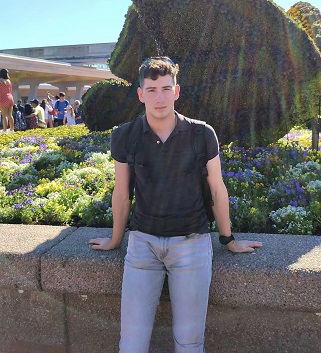
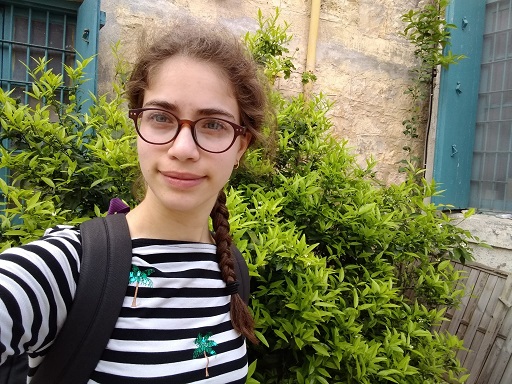





 Professor Miki Makihara
was tapped by CBS Sunday Morning for her expertise on Rapa Nui, also
known as Easter Island, in a piece about the first music school on the
island: https://www.cbsnews.com/news/rapa-nui-first-music-school-on-easter-island/
Professor Miki Makihara
was tapped by CBS Sunday Morning for her expertise on Rapa Nui, also
known as Easter Island, in a piece about the first music school on the
island: https://www.cbsnews.com/news/rapa-nui-first-music-school-on-easter-island/





 We
are deeply saddened by the
recent loss of one of our professor emeriti, Warren
DeBoer.
Professor Warren DeBoer joined
the Department of
We
are deeply saddened by the
recent loss of one of our professor emeriti, Warren
DeBoer.
Professor Warren DeBoer joined
the Department of  Photo of Gueorgui Milkov at work (by Mackenzie
Stroh)
Photo of Gueorgui Milkov at work (by Mackenzie
Stroh)